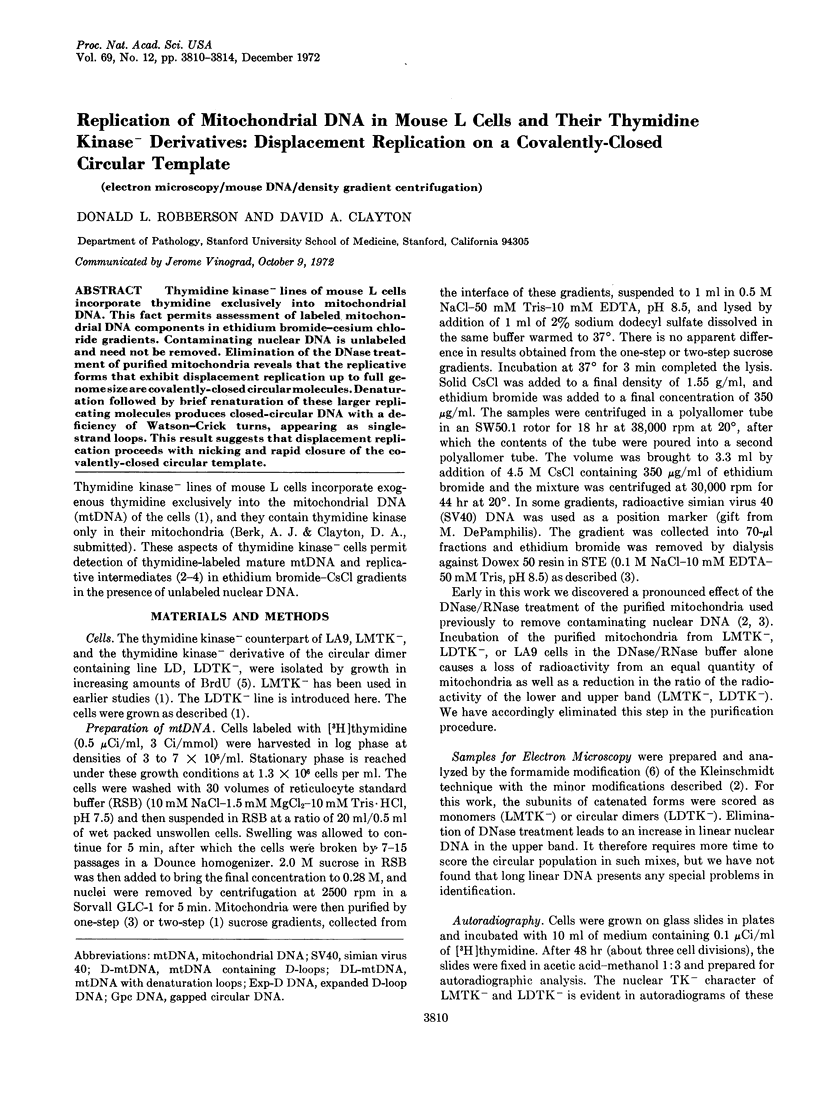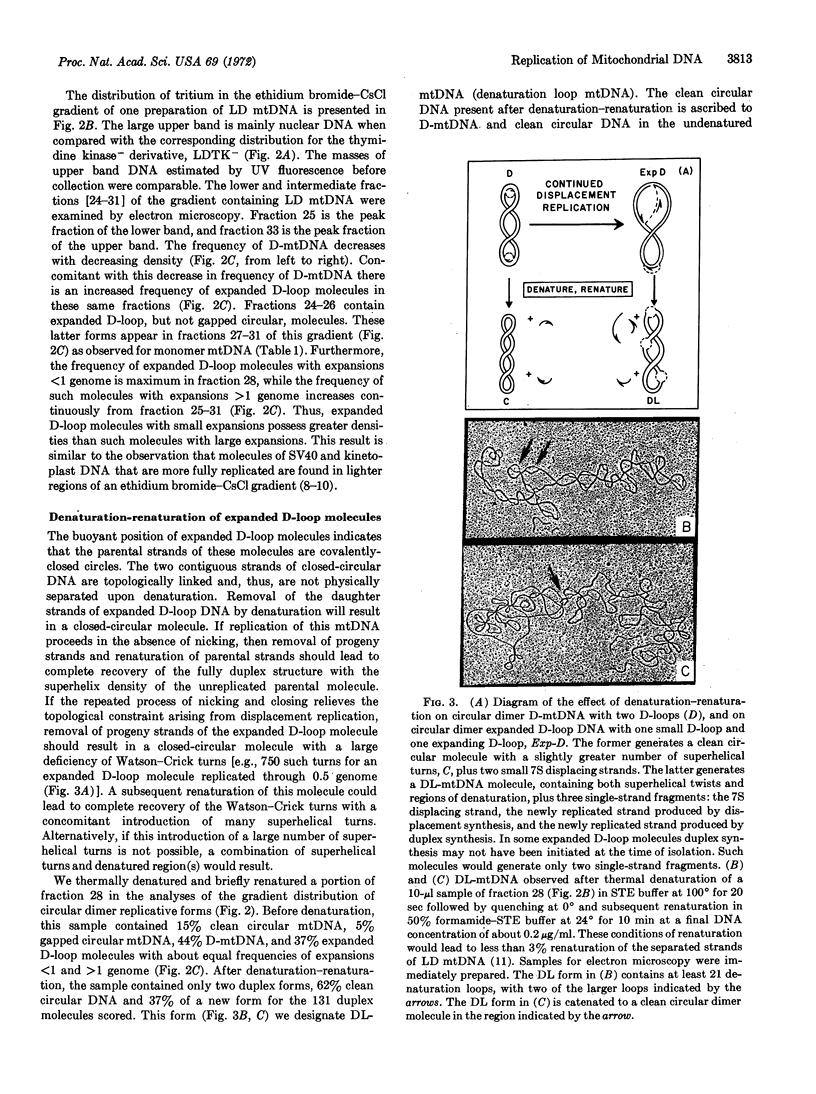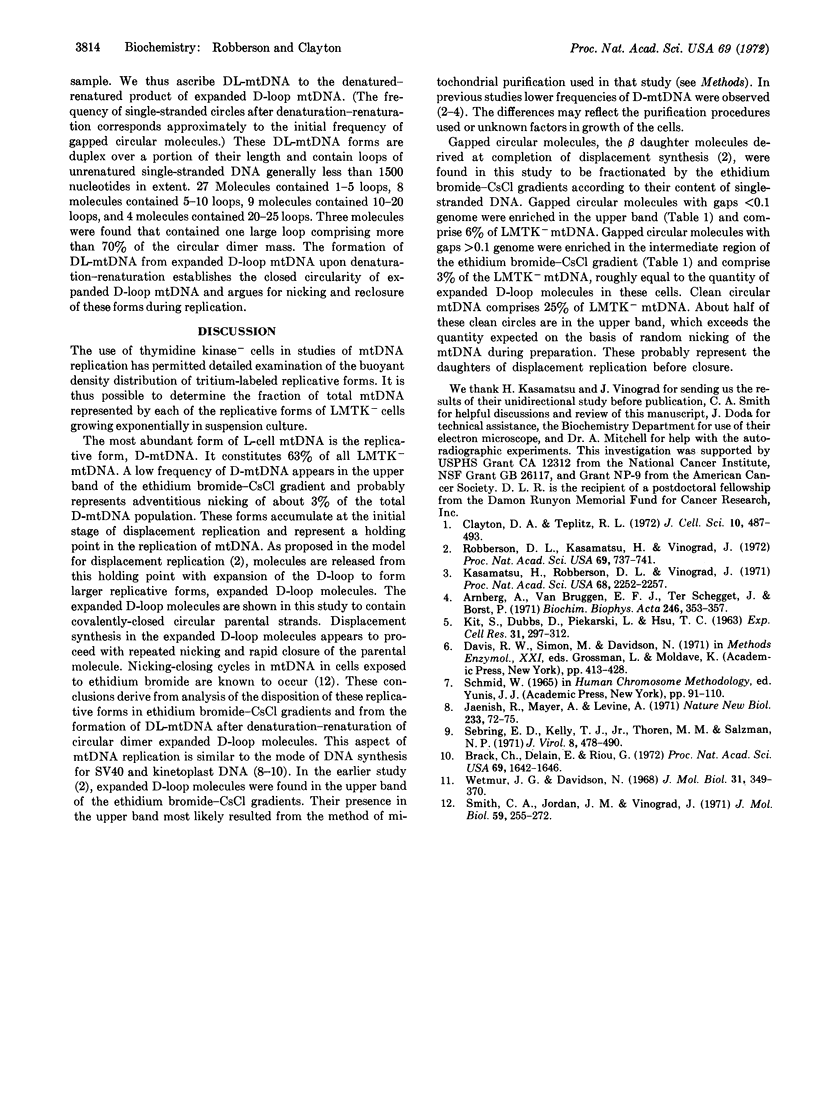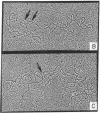Abstract
Thymidine kinase- lines of mouse L cells incorporate thymidine exclusively into mitochondrial DNA. This fact permits assessment of labeled mitochondrial DNA components in ethidium bromide-cesium chloride gradients. Contaminating nuclear DNA is unlabeled and need not be removed. Elimination of the DNase treatment of purified mitochondria reveals that the replicative forms that exhibit displacement replication up to full genome size are covalently-closed circular molecules. Denaturation followed by brief renaturation of these larger replicating molecules produces closed-circular DNA with a deficiency of Watson-Crick turns, appearing as single-strand loops. This result suggests that displacement replication proceeds with nicking and rapid closure of the covalently-closed circular template.
Keywords: electron microscopy, mouse DNA, density gradient centrifugation
Full text
PDF




Images in this article
Selected References
These references are in PubMed. This may not be the complete list of references from this article.
- Arnberg A., van Bruggen E. F., Borst P. The presence of DNA molecules with a displacement loop in standard mitochondrial DNA preparations. Biochim Biophys Acta. 1971 Aug 26;246(2):353–357. doi: 10.1016/0005-2787(71)90147-x. [DOI] [PubMed] [Google Scholar]
- Brack C., Delain E., Riou G. Replicating, convalently closed, circular DNA from kinetoplasts of Trypanosoma cruzi. Proc Natl Acad Sci U S A. 1972 Jun;69(6):1642–1646. doi: 10.1073/pnas.69.6.1642. [DOI] [PMC free article] [PubMed] [Google Scholar]
- Clayton D. A., Teplitz R. L. Intracellular mosaicism (nuclear - -mitochondrial + ) for thymidine kinase in mouse L cells. J Cell Sci. 1972 Mar;10(2):487–493. doi: 10.1242/jcs.10.2.487. [DOI] [PubMed] [Google Scholar]
- Jaenisch R., Mayer A., Levine A. Replicating SV40 molecules containing closed circular template DNA strands. Nat New Biol. 1971 Sep 15;233(37):72–75. doi: 10.1038/newbio233072a0. [DOI] [PubMed] [Google Scholar]
- KIT S., DUBBS D. R., PIEKARSKI L. J., HSU T. C. DELETION OF THYMIDINE KINASE ACTIVITY FROM L CELLS RESISTANT TO BROMODEOXYURIDINE. Exp Cell Res. 1963 Aug;31:297–312. doi: 10.1016/0014-4827(63)90007-7. [DOI] [PubMed] [Google Scholar]
- Kasamatsu H., Robberson D. L., Vinograd J. A novel closed-circular mitochondrial DNA with properties of a replicating intermediate. Proc Natl Acad Sci U S A. 1971 Sep;68(9):2252–2257. doi: 10.1073/pnas.68.9.2252. [DOI] [PMC free article] [PubMed] [Google Scholar]
- Robberson D. L., Kasamatsu H., Vinograd J. Replication of mitochondrial DNA. Circular replicative intermediates in mouse L cells. Proc Natl Acad Sci U S A. 1972 Mar;69(3):737–741. doi: 10.1073/pnas.69.3.737. [DOI] [PMC free article] [PubMed] [Google Scholar]
- Sebring E. D., Kelly T. J., Jr, Thoren M. M., Salzman N. P. Structure of replicating simian virus 40 deoxyribonucleic acid molecules. J Virol. 1971 Oct;8(4):478–490. doi: 10.1128/jvi.8.4.478-490.1971. [DOI] [PMC free article] [PubMed] [Google Scholar]
- Smith C. A., Jordan J. M., Vinograd J. In vivo effects of intercalating drugs on the superhelix density of mitochondrial DNA isolated from human and mouse cells in culture. J Mol Biol. 1971 Jul 28;59(2):255–272. doi: 10.1016/0022-2836(71)90050-7. [DOI] [PubMed] [Google Scholar]
- Wetmur J. G., Davidson N. Kinetics of renaturation of DNA. J Mol Biol. 1968 Feb 14;31(3):349–370. doi: 10.1016/0022-2836(68)90414-2. [DOI] [PubMed] [Google Scholar]




